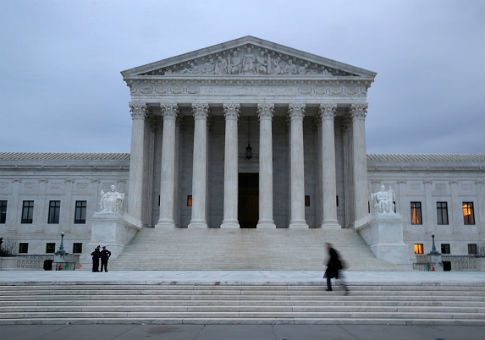The Supreme Court agreed on Monday to review the legality of President Donald Trump's executive order barring travel from six countries in the Middle East and North Africa.
The high court allowed a weakened version of the ban to go into effect before justices hear arguments on the case in October, the New York Times reported.
Trump's released the revised executive order in March calling for a 90-day ban on travelers from six Muslim-majority countries—Libya, Iran, Somalia, Sudan, Syria, and Yemen. It also imposed a 120-day suspension on the nation's refugee resettlement program. The administration has argued the measure is necessary to prevent terrorists from attacking the United States.
The Supreme Court said individuals with "close familial" relationships or "formal, documented" ties to an entity, such as a business or university, in the United States will not be prohibited from entering the country. Foreigners applying for visas who have never traveled to the United States and do not have family or business ties could still be barred.
"In practical terms, this means that [the executive order] may not be enforced against foreign nationals who have a credible claim of a bona fide relationship with a person or entity in the United States," the justices wrote.
Two federal appeals courts have blocked key elements of the order from taking effect. The Trump administration has called on the Supreme Court to overturn their decisions.
The U.S. Court of Appeals for the Fourth Circuit in Richmond, Va., ruled in May that Trump's order was motivated by religious purposes. The justices cited Trump's campaign rhetoric and said they were "unconvinced" the order had "more to do with national security than it does with effectuating the president's promised Muslim ban."
In a White House statement on Monday, Trump said the Supreme Court announcement was a "clear victory for our national security."
"As President, I cannot allow people into our country who want to do us harm," he said. "I want people who can love the United States and all of its citizens, and who will be hardworking and productive. My number one responsibility as Commander in Chief is to keep the American people safe. Today's ruling allows me to use an important tool for protecting our Nation's homeland."
UPDATE: 1:14 P.M.: This article was updated with the official White House statement on the decision.
